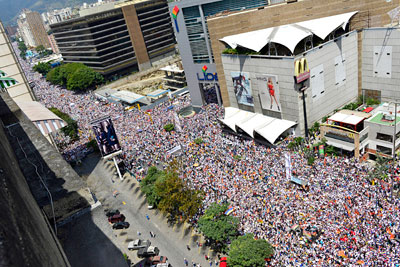 |
| AP Photo/Carlos Becerra |
|
In face of an escalating capitalist social and economic crisis in Venezuela, bourgeois opposition to the government of President Nicolás Maduro has mushroomed into demonstrations by hundreds of thousands over the last several weeks. Above is an anti-government rally in Caracas, Feb. 22. National Guard, police and pro-government groups have clashed with anti-government protesters. Inflation is running at an annual rate of 56 percent; there are widespread shortages of food and basic goods; and crime is rampant. Auto assembly production is down 85 percent since last year. A majority of the capitalist class opposes the Maduro government and have seized the opportunity to mount protest actions across the country. With the strongest backing among owners of businesses large and small, middle-class professionals and students, the demonstrations have also tapped into rising discontent among working people frustrated by deteriorating social conditions and policies of a government that has become weaker and more unstable since the death of former President Hugo Chávez in 2012. Washington has tried to undermine the government ever since Chávez was elected president in 1998 and reorganized the country’s oil industry, using a part of oil profits to subsidize food and fuel costs and to fund social programs. The U.S. government especially hates the Venezuelan government’s ties with revolutionary Cuba, which has sent tens of thousands of volunteers to Venezuela to aid in literacy programs and provide free medical care. Caracas in turn has been sending more than 100,000 barrels of subsidized oil a day to Cuba, which opposition politicians have vowed to end. — SETH GALINSKY |
